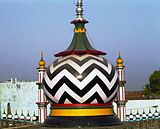- Hamid Raza Khan
-
Hujjatul Islam Maulana Hamid Raza Khan Qadri Full name Hujjatul Islam Maulana Hamid Raza Khan Qadri Born 1875 CE
Rabi-ul-Awwal 1292 Hijri
Bareilly, IndiaDied 23rd May 1943 CE
17 Jamadi-ul-Ulaa HijriRegion India School Sunni, Hanafi Main interests Aqeedah, Fiqh, Tasawwuf Notable ideas Love of Muhammad, Firmness on Shariah Influenced by- Abdul Qadir Jilani, Ahmad Raza Khan, Shah Abul Hussain Ahmad Noori
Influenced- Mufti Akhtar Raza, Maulana Ibrahim Raza Khan, Maulana Sardar Ahmed Qadri,
Hamid Raza Khan Qaadiri: was an Islamic scholar (Hujjat-ul-Islam) and mystic of the Barelvi movement. Qaaderi was born in 1875 (Rabi' al-awwal 1292 Hijri), in the city of Bareilly, India. The name given at the time of his aqeeqah was Muhammad, as it was family tradition.[1]
Contents
Lineage
Maulana Hamid Raza Khan son of Ala Hazrat Imam Ahmad Raza Khan son of Maulana Naqi Ali Khan son of Maulana Raza Ali Khan.[1]
Basic Education
He received his early education under the tutorship of his father Imam Ahmad Raza Khan. By the age of 19, he completed his formal Islamic studies.[2] His own father admired Qaaderi for his sincerity and dedication in gaining knowledge. Ahmad Raza Khan loved him so dearly, that he said: Haamidum minni wa ana min Haamid ("Haamid is from me and I am from Haamid.")[1] He was proficient in both Arabic and Persian, as well as a master in the field of ahadith, fiqh, philosophy, mathematics and many other fields.[3]
Initiation into Silsila and Khilafah
Central figures Ahmed Raza Khan Barelvi
Fazl-e-Haq KhairabadiOrganizations World Islamic Mission
Jamaat Ahle Sunnat
Sunni Tehreek
Jamiat Ulema-e-Pakistan
Dawat-e-Islami
Raza Academy
Sunni Dawat-e-IslamiInstitutions Al Jamiatul Ashrafia · Manzar-e-Islam
Al-Jame-atul-Islamia · Jamiatur RazaLiterature History Indian Rebellion of 1857
Pakistan Movement
2006 Nishtar Park bombing
Asassination of Sarfraz NaeemiNotable individuals Mustafa Raza Khan
Qamaruzzaman Azmi
Hamid Raza Khan
Akhtar Raza
Abdul Aleem Siddiqi
Shah Ahmad Noorani
Syed Shujaat Ali Qadri
Muhammad Muslehuddin SiddiquiBeliefs and practices Sunni Islam · Sufism
Taqlid · Tawassul
Mid-Sha'ban · Mawlid
Khatim an-NabuwwahQaaderi was a mureed of Abul Hussain Ahmad Noori of Mahrera, and was initiated into the Barkatiya Silsila. Noori Miya had immense love for Raza Khan and guided him spiritually. Khan was also blessed with khilafat from his father, Ahmad Raza Khan.[1]
Literary works
Raza Khan wrote and translated numerous books on a variety of subjects. Amongst his famous works were his compilation of "Risaal-e-Jaleela". He has also translated many books of his father. One of the books he has translated is 'Ad Daulatul Makkiya Bil Mad'datil Ghaibiya', which was translated from Arabic to Urdu. This book dealt with the subject of the knowledge of the unseen.[2]
Raza Khan's works include:[1]
- As Saarimur Rabaani alaa Asraaf Qaadiyani
- Translation of Ad Daulatul Makkiyah
- Translation of Husaamul Haramain
- Haashia Mulla Jalaal
- Naatia Deewaan
- Majmua Fatawa
Position in the Sufist hierarchy
Sheikh Hujjatul Islam, Maulana Haamid Raza Qaaderi (radi Allahu anhu) is the fortieth Grandmaster in the Spiritual Chain of the Aaliyah Qaderiyah Barakaatiyah Radawiyyah Order. He is the eldest son of Ala Hadrat Imam Ahmed Raza Khan Fazil-e-Bareilly (radi Allahu anhu).
Passing Away
Haamid Raza Qaaderi passed away on the 17th of Jamadi-ul-Ulaa (23 May 1943) while praying. He was sitting in the tashahud position when he died. Hundreds of thousands of devotees and mureeds gathered for his funeral prayers, which wer performed by his khalifa, Muhaddith-e-Azam Pakistan, Sardaar Ahmad.
His tomb is beside his father. Every year thousands of Muslims attend his urs to pay tribute.[1]
See also
- Ahmad Raza Khan
- Ahle Sunnat Wal Jamaat
- Mustafa Raza Khan
- Abu Bilal Muhammad Ilyas Attar Qadri
- Akhtar Raza
- Qari Muslehuddin Siddiqui
References
Categories:- Muslim scholars
- People from Uttar Pradesh
- Indian Sufis
- Hanafis
- Barelvi
- Islam in the United Kingdom
- Islam in Afghanistan
- 1875 births
- 1943 deaths
Wikimedia Foundation. 2010.

